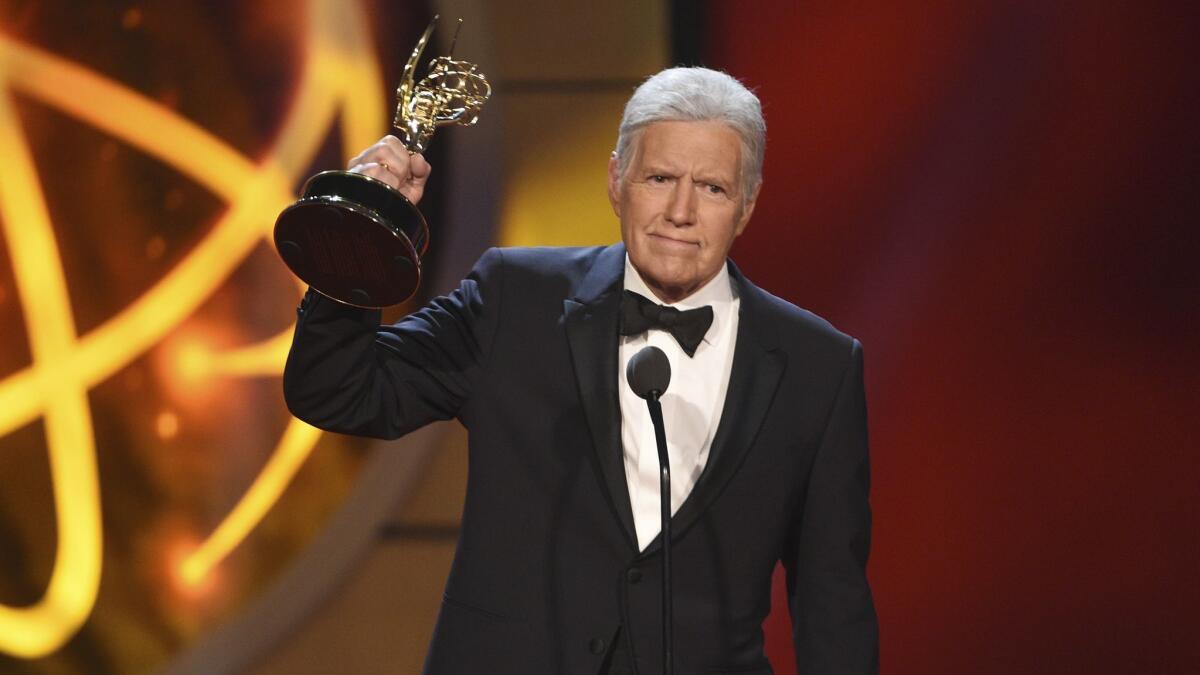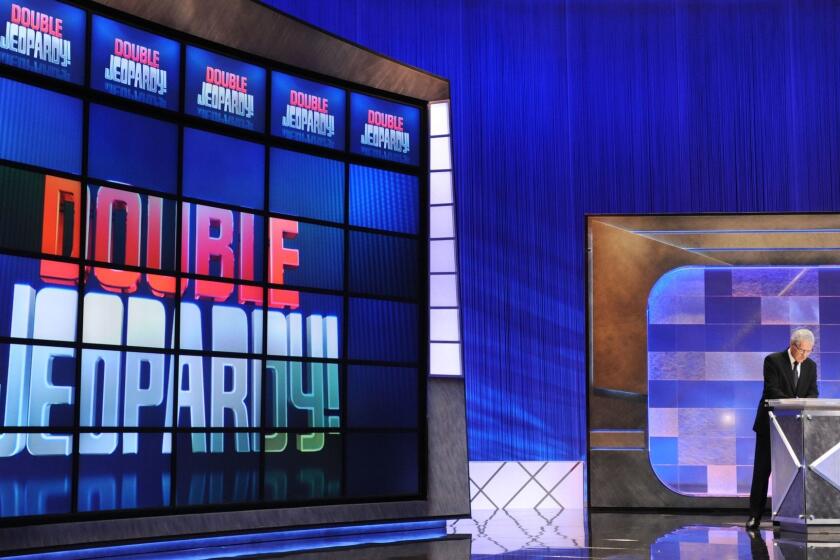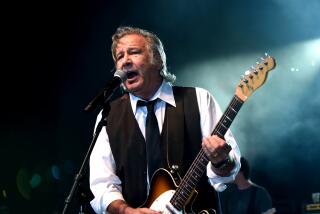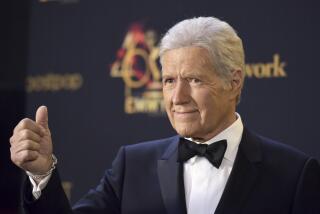Appreciation: The irreplaceable Alex Trebek made ‘Jeopardy!’ a sane place in a mad world

Alex Trebek, the host of “Jeopardy!” for more than 35 years, died Sunday at age 80 from pancreatic cancer. That is a contest many of us were following and hoped somehow he would never lose.
Nineteen months after making his diagnosis public — months through which he continued to host the show, published a book, “The Answer Is… Reflections on My Life,” and kept the public abreast of his progress in a way that was informative and forthcoming without breaching the modesty he wore like a bespoke suit — the clock has run out. Merv Griffin’s “Final Jeopardy” theme winds down to silence. The answer and the question are one.
There have been many great game show hosts across the years. Gene Rayburn, Allen Ludden, Monty Hall, Peter Marshall and Richard Dawson are some I grew up on; Jane Lynch, Drew Carey, Anthony Anderson and Steve Harvey are among those currently holding aloft that torch. But Trebek stands apart — a beloved figure, a historical personage. You could be well into middle age and never have known a world in which Trebek did not host “Jeopardy!” Until now.
He hosted other shows — you will likely not remember him as the host of “The Wizard of Odds,” “Double Dare,” “High Rollers,” “Battlestars,” “The New Battlestars,” “Classic Concentration” or “To Tell the Truth,” nor his decade-plus in Canadian broadcasting, including “CBC Championship Curling,” before moving to America. But none suited him as well, or was as well-suited to him, as “Jeopardy!” There are marriages, and there are marriages made in heaven. (It was a second time around for the show too, originally hosted by Art Fleming.)
After a long battle with pancreatic cancer, the celebrated game show host passed away at his home.

Here are some things you might not know about Trebek, but which, even when surprising to learn, do not seem all that surprising. He graduated from the University of Ottawa with a degree in philosophy, spoke French, was the son of a chef, ran a leg carrying the Olympic torch in 1996 and bred racehorses. Long before he was played by Will Ferrell on “Saturday Night Live,” he was played (as Alex Trebel) by Eugene Levy on “SCTV.” He appeared as himself in many movies and television shows, including “Rain Main,” “Short Cuts,” “The Larry Sanders Show,” “Cheers,” “Seinfeld,” “The Simpsons” and “Orange Is the New Black,” and he played a Man in Black (alongside Jesse Ventura) in the famous “Jose Chung’s From Outer Space” episode of “The X-Files.” He styled himself a political moderate with libertarian leanings; if “Jeopardy!” could vote, I imagine it would take a similar stance.
The world might go mad, but “Jeopardy!” is a sane, safe place, where facts rule, science is real, the news is never fake, and knowing things is more important than feeling them. It is the Sunday crossword puzzle of game shows, chess where the others are checkers. Playing along at home is an exercise in satisfaction (when you’re right) or an opportunity for education (when you’re wrong). Big network game shows give away more money for answering easier questions, but “Jeopardy!” big winners are stars for life, heroes in their community.
When Trebek announced to the world the disease that would finally kill him, it was with perspective and proportion, like a Lou Gehrig of TV hosts, noting that he’d been given a bad break but that he had an awful lot to live for. “I have some news to share with all of you, and it’s in keeping with my longtime policy of being open and transparent with our ‘Jeopardy!’ fan base,” he said, by video and not from home plate at Yankee Stadium, though he could have filled it many times over with fans and well-wishers. “Just like 50,000 other people in the United States each year,” Trebek said, “this week, I was diagnosed with Stage IV pancreatic cancer.” In spite of his “dim prospects,” he would fight it, he said, “because under the terms of my contract, I have to host ‘Jeopardy!’ for three more years.”
Especially in light of host Alex Trebek’s health woes, the “Jeopardy! Greatest of All Time” tournament is an ideal time to appreciate a TV institution.
He was a particularly handsome man all his life, though he sometimes hid that light behind a bushy mustache. (Hairpieces, he admitted, made up for the side effects of his cancer treatment, though they were very fine hairpieces.) Though he was only 5 feet 8 inches, his bearing and manner gave an impression of great height; in my mind, he had to be 6 feet 2 at least. Similarly, although it is possible that he did not actually already know all the answers to the “Jeopardy!” questions — or all the questions to the answers, as it were — something in the way he would correct a wrong response, or add additional information to a correct one, suggested that all that knowledge, and perhaps all of knowledge, was his.
Other hosts may be funny, or fun, or clever, or intelligent; they are, as a class, well-dressed and well-spoken. Trebek could be drily witty, even a little caustic — attempts to paint him as rude or superior seem a little purposeful, and based on the same few clips, which might easily be termed puckish — but rollicking humor was not in any case the “Jeopardy!” style, where audience participation amounted to an expectant hush. There were exceptions, to be sure, more valuable for excepting the rule: Trebek rapping; singing answers in autotune; emoting Shakespeare; coming onstage pants-less. (You needed to be an Alex Trebek to make that work; there would be nothing funny about Drew Carey doing it.) Other hosts may come and go, but Trebek found his place and stayed. He put down roots, built a hall. People came and a community was born. We’ve lost not just a host, then, but a leader.
More to Read
The complete guide to home viewing
Get Screen Gab for everything about the TV shows and streaming movies everyone’s talking about.
You may occasionally receive promotional content from the Los Angeles Times.








